Henryk Műnch

The "Save the Memory" project is a series of video interviews with witnesses of history from 1939- 1956. It was created to preserve the memories and experiences of the heroes and heroines from this period.
At the beginning of the film. the logos of the Polish History Museum are illustrated, featuring a yellow crown, gray wings, and the letter "P" in red with the Polish flag in the center. Also detailed is the phrase ”Patriotism of Tomorrow” with the letter "P" in black. Underneath these icons, there is a white inscription "Project co-financed by the Museum of Polish History in Warsaw as part of the Patriotism of Tomorrow program."
The main character of the film is Henry Munch. He was born in 1906 and died in 1968. A soldier of
the Union of the Armed Struggle-Home Army (ZWZ-AK), pseudonym "Mnich," an activist of the
Delegation of Armed Forces at Home, a guardian of the Katyn documents, and a political prisoner
under the communist regime. After the war, he was an activist of "Freedom and Independence"
Association, alias "Misniak" and a historian, urban planner, and archivist. His story is told by his son,
Stefan Munch.
The man is captured up to his shoulders. He is about 70-80 years old. He has gray hair
and a gentle oval face. He is dressed in a gray shirt and glasses.
Throughout the film, he shows material from his private archive, such as family photos. At the end of
the film appears a blackboard with the blue logo of the Historical Museum of the City of Krakow and
the white logo of Oskar Schindler's Emalia Factory Lipowa 4. At the bottom is the website address:
www.ocalicpamiec.mhk.pl and the year of production - 2013.
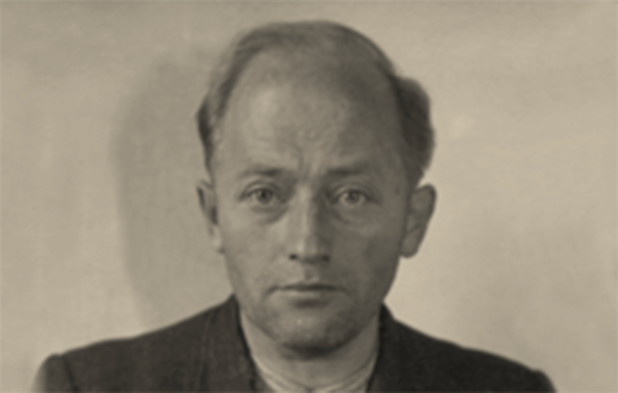
Henryk Műnch
1906 – 1968

Black and white photograph of the arrest of forty-year-old Henryk Munch. The man has a soiled face. He is dressed in a collarless shirt and a black jacket.
Henryk Münch (born 11 January 1906 in Zawiercie, died 10 January 1968 in Kraków). Son of Anna (family name Brandt) and Fryderyk. Soldier of ZWZ AK, pseudonym: Mnich. Member of Delegatura Sił Zbrojnych na Kraj. After the war, a member of WiN, Pseudonym: Miśniak. Historian, town planner, and archivist.
In 1928 Henryk Münch graduated from Jagiellonian University (MA in history and geography) and and started work at Archiwum Akt Dawnych Miasta Krakowa (today the National Archive in Kraków). 4 years later he received his PhD in philosophy from Jagiellonian University.
After WWII broke out, he worked at the Military Censorship Bureau while continuing his work at Archiwum Akt Dawnych Miasta Krakowa where he helped to save the archive from being destroyed or stolen by the Germans.
In 1941 he joined ZWZ – AK (pseudonym Mnich) where he was an active member until 19 January 1945 when the organization was disbanded. While serving in the underground resistance, Henryk Münch was a team leader and later a vice platoon commander. In January 1942 by the decision of the Komenda Główna (chief headquarters), he was raised to the rank of Infantry Second Lieutenant.
In June 1945 he continued his underground work thanks to Jan Kot (pseudonym Janusz), who was head of the Biuro Studiów Brygad Wywiadowczych (later, part of WiN). He was given the pseudonym Miśniak and was an archivist for the Biuro Studiów Brygad Wywiadowczych. In all probability, Henryk Münch kept exhumed Katyń documentation and hid them in Archiwum Akt Dawnych between May 1943 and August 1946 when he was arrested. Later the the documents were secretly transported to the Kraków Curia.
Henryk Münch was arrested on August 28 1946 and on 10 September 1947 was sentenced to 15 years in prison, deprived of his public rights for 5 years, and had his property confiscated. He was held in Montelupich prison in Kraków as well as prisons in Wronki, Sieradz, and Warsaw. He was released after 10 years, on 28 August 1956, during a political thaw.
After his release, Henryk Münch became curator and the head of the scholarly and publishing department at the Historical Museum of the City of Kraków. In March 1961 he received his habilitation degree from the Jagiellonian University. Until 1966 he lectured town planning at the archeology department of Jagiellonian University. He died two years later and was buried at Rakowicki Cemetery in Kraków.
On 17 January 1992, Henryk Münch was politically rehabilitated.
He was married to Irena (family name Musienko) and had a son Stefan.
Gallery
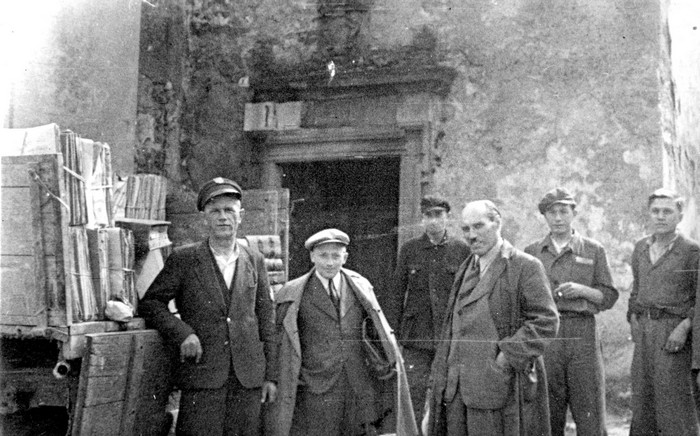
Henryk Münch while transporting documentation to Archiwum Akt Dawnych. Kraków 1944.

Black and white photo of several men taken in Tyniec during the transfer of the Benedictine Fathers' collection to the Archive of Historical Records before the Red Army entered. The group is in front of the abbey, with a wooden cart loaded with the collection in the background. Three men are dressed in black suits with cornets and longcoats. Behind them, in the background, are three young men in loose, working clothes.
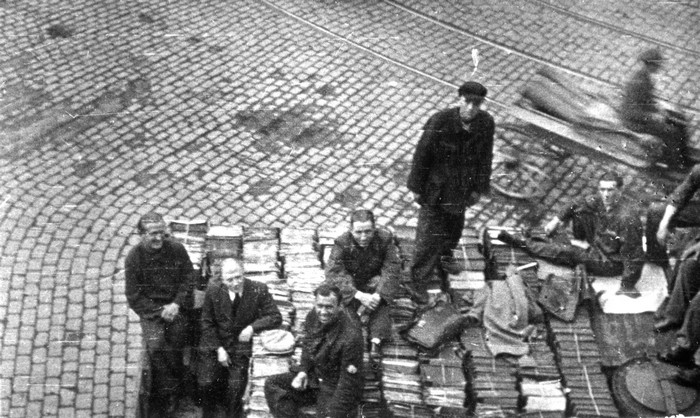
Henryk Münch in front of Archiwum Akt Dawnych. Kraków 1944.

Black and white photo of a group of men in front of the Archive of Ancient Records in Kraków during the transfer of the Benedictine Fathers' collection from Tyniec. The photo was taken from above. Behind them are street car rails and a man riding a horse-drawn carriage. The men have their heads raised and are smiling as they sit on piles of documents on the cobblestones. They are dressed in suits and darkcoats.
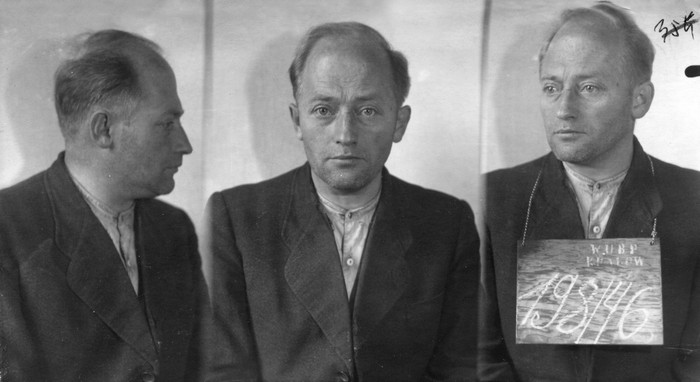
Henryk Münch in prison. Kraków 1946.

Black and white photograph of the arrest of forty-year-old Henryk Munch. The man has a soiled face. He is dressed in a collarless shirt and a black jacket. Three photographs are shown, which show profiles of Henryk. In the last photo, the man has a plaque around his neck bearing the number 198/46.
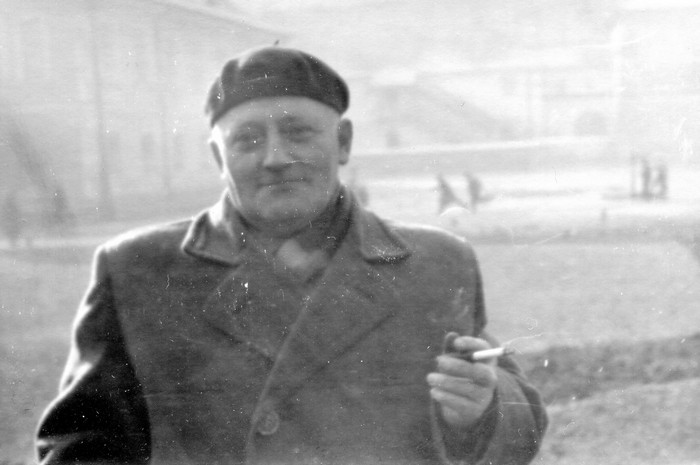
Henryk Münch. Kraków, December 1959.

A photo of fifty-year-old Henry Münch in St. Spirit Square in Krakow. Behind him is a square covered with a thin layer of snow and you can observe children playing. The man has a round face, is smiling, and is wearing a beret. He is dressed in a coat and scarf and is holding a cigarette in his hand.
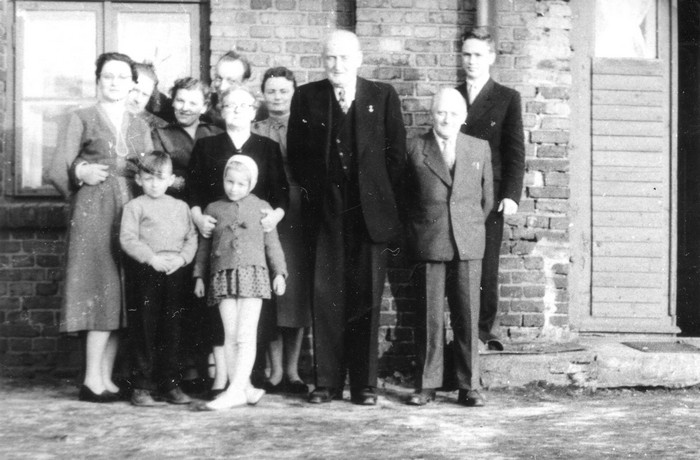
Henryk Münch with his family in Kraków in the 1950s. From the right: his sons: Stefan and Henryk.

Black and white photograph of Henrik Münch with his family. They pose against the background of a red brick house. A man is standing on the right with his son Stefan behind him. In the center stands an older, tall man dressed in a black, loose-fitting suit. To the left are four women of various ages, with two men behind them. In front of the women are two young children.
